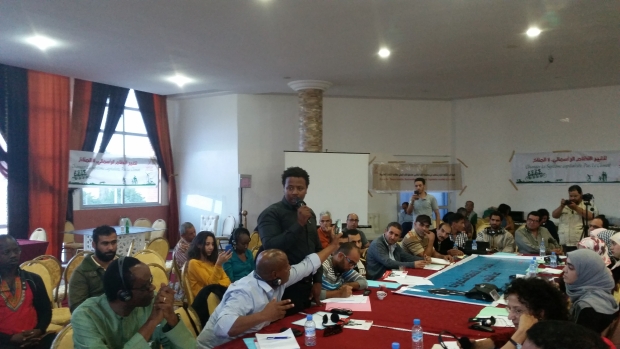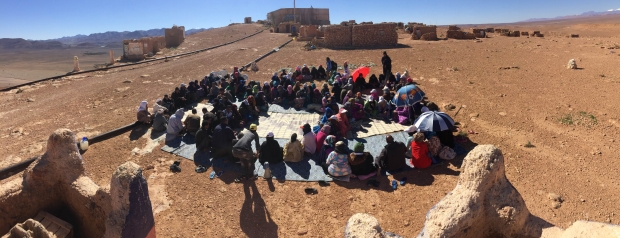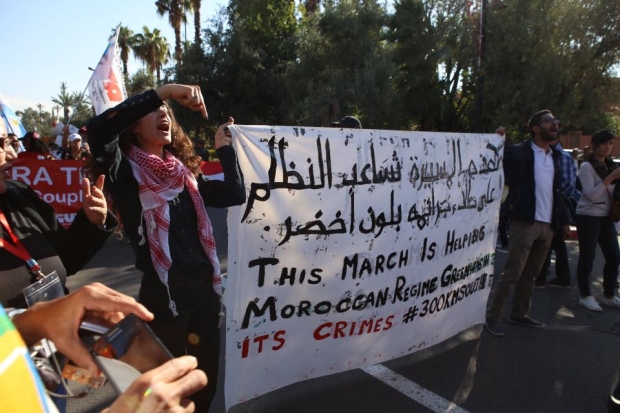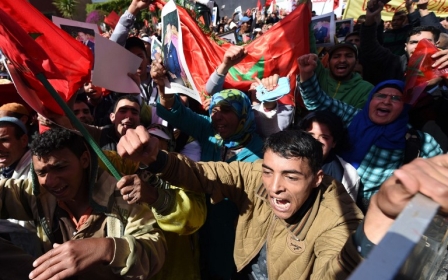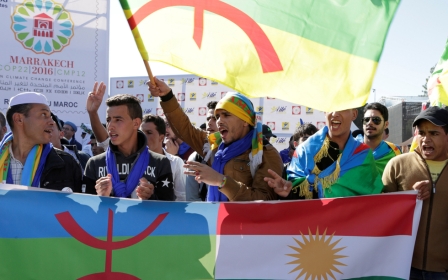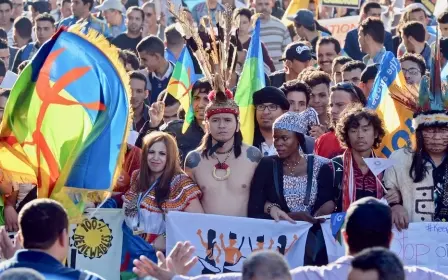We can't tackle environmental and social justice in Morocco if we don't talk about Western Sahara
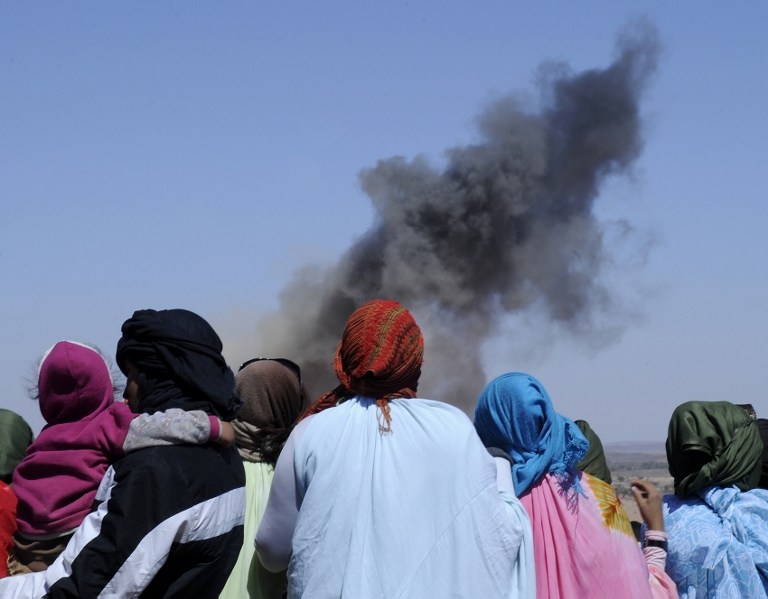
In the last two weeks, the touristic town of Marrakech in Morocco hosted the 22nd edition of the climate talks under the auspices of the United Nations.
Marrakech was therefore the destination of many politicians, journalists, corporate lobbyists, climate and environmental activists as well as representatives of communities and indigenous people who are at the frontlines of the ecological and climate crisis and destructive extractivism - a colonial and neocolonial development model based on extractive industries.
Today, it is expected, with much fanfare and deceptive propaganda that the leaders of the world will announce a "historic" action plan after the "historic" deal of COP21 in Paris.
COP22 is supposed to be an opportunity for action to avert climate chaos but unfortunately, like its predecessors, it is nothing of the sort.
Hijacked conference
Despite the global threat, governments continue to allow carbon emissions to rise and the crisis to escalate. Corporate power has hijacked the talks to promote more profit-making “false solutions”.
Amongst the official partners of this COP are the Moroccan phosphate company, Office Chérifien des Phosphates (OCP) and the Royal Holding mining company Managem, who have been responsible for environmental destruction, health problems and dispossessing people of their much needed resources like land, water, fish and other natural resources. Safi and Imider are emblematic cases in this regard.
Alongside other grassroots activists who were opposed to this COP, I worked to draw attention to the Makhzen's (a term that refers to the king and the ruling elite around him) attempt to use the climate talks as an opportunity to whitewash its brutal authoritarian and corrupt rule.
The COP22 was a golden chance for the rapacious monarchy to greenwash its environmental crimes and land and resources plunder, facts that give a contradicting narrative to the green discourse we hear about in mainstream media.
This greenwashing is facilitated by a non-autonomous, artificial and institutional civil society, represented in this case by the Moroccan Coalition for Climate Justice, which plays the role of containing the civil society at large and silencing and marginalising the radical voices calling for real and meaningful change.
Our efforts to counteract this disingenuous discourse led to the organisation of a successful anti-COP22 international conference. Entitled "System Change, not Climate Change", the conference was held in the ocean town of Safi, an area that has been sacrificed to implement an extractivist model of economic development: a phosphate factory, a cement factory and a coal-fired power station being built on its shores, contradicting the Makhzen's "green" rhetoric.
We also organised a solidarity caravan to the peasant villages of Imider who erected a six-year protest camp against the royal holding silver mine that is grabbing their water, polluting their environment and destroying their livelihood.With the communities and the internationals present - Algerians, Moroccans, Tunisians, a Kenyan and one indigenous person from the Navajo tribe - we held workshops that popularised concepts such as extractivism, environmental justice and eco-feminism as well as holding a successful open-air political film festival.
This sharing of environmental injustice experiences reinforced the belief that we are all facing and resisting an extractivist system that is accumulating wealth by excluding many of us, especially people of the global South and people of colour.
The Moroccan authorities were not happy with this kind of regional and international solidarity and linkage which are seen as threats as they could create strong bridges and embolden people to continue their resistance and put forward truly sustainable alternatives, which will shake the oppressive status quo. After leaving the protest camp, the caravan was harassed and stopped at a checkpoint for around an hour.
This is a very sensitive and contentious issue in the kingdom and anybody giving open support to the right of Saharawi's for self-determination will be labelled a traitor - someone wanting to destabilise the integrity of the kingdom - and can be subject to violence and harsh intimidation.
These have become common and normalised practices inside and outside Morocco, even in "progressive" spaces such as the World Social Forum.
By expropriating Saharawis and poor Moroccans, the Makhzen is entrenching its colonial and neocolonial rule that enriches a minority of Moroccan and foreign interests at the expense of the majority.
Last week, I attempted to visit the occupied zone, but I was stopped just before Tarfaya, southern Morocco and was not allowed to proceed to Laayoune with the pretext that there were some instructions from high up to not let me in.
In the past, several delegations have been expelled and deported. But why are the Moroccan authorities keeping a stronghold and a close watch on internationals wanting to visit the occupied territories?
The answer is simple: they don't want internationals to show solidarity with the Saharawis and they want to keep a tight lid on the ongoing projects that uphold its occupation: phosphate mining, agribusiness, fishing and renewable energy. Yes, renewable energy!
Green colonialism
While some of the projects in Morocco, like the Ouarzazate Solar Plant can qualify as "green grabbing" - the appropriation of land and resources for purportedly environmental ends - similar renewable projects (solar and wind) that are taking place in the occupied territories of Western Sahara can be labelled "green colonialism" as they are carried out in spite of the Saharawis and on their confiscated land.
By 2020, more than a quarter of all Morocco’s green energy production will be located in the territory it holds under foreign occupation
Just a few days ago, Saudi-Arabia's ACWA Power signed an agreement with the Moroccan Agency for Solar Energy (MASEN) to develop and operate a complex of three power stations of solar photo-voltaic (PV) totaling 170 MW. Two of those power stations, totaling 100 MW, will however not be located in Morocco, but inside the occupied territory.
The Western Sahara Resource Watch recently published an excellent report entitled "Powering the Plunder" showing how renewable projects are being used to entrench the occupation by deepening Morocco's ties to the occupied territories.
The report states that 22 newly built mills by the German company Siemens supply 95 percent of the energy required for the highly controversial plunder of non-renewable minerals (such as phosphate) from Western Sahara. What is shocking is that by 2020, according to the report, more than a quarter of all Morocco’s green energy production will be located in the territory it holds under foreign occupation.
Asking the hard questions
Once again, the climate talks have been an opportunity for transnational elites (to which the Makhzen belongs) to push for a supposedly green propaganda, that financialises nature, privatises our resources and livelihoods and reinforce their authoritarian rule.
Who owns what? Who does what? Who gets what? Who wins and who loses? And whose collective, public good is being served?
COP22 is just another occasion for the Makhzen to embellish its facade by championing what is called "green capitalism" and, at the same time, continue the silencing and exclusion of Saharawis and the majority of Moroccans.
It is time to organise outside these suffocating structures that work against the interests of the majority of people and that reinforce a capitalist and imperialist order. It is incumbent upon the radical left and the environmental/climate justice movement to critically approach the Makhzen's green propaganda and the emergent dominant global discourse around the green economy to which it is linked.
Activists must ask the critical questions that will shift our focus to the materiality of renewable energy: who owns what? Who does what? Who gets what? Who wins and who loses? And whose collective, public good is being served?
Answering these questions through a distributive justice lens, while taking account the colonial and neo-colonial legacies, and issues of race, class, and gender will reveal what these projects are nothing less than "green grabbing" and "green colonialism".
- Hamza Hamouchene is an Algerian writer, activist, co-founder of Algeria Solidarity Campaign (ASC) and Senior Programme Officer- North Africa and West Asia at War on Want. His writings appeared in the Guardian, Huffington Post, Counterpunch, Jadaliyya, New Internationalist and openDemocracy.
The views expressed in this article belong to the author and do not necessarily reflect the editorial policy of Middle East Eye.
Photo: Sahrawi people look at an explosion of mines in February 2011 near the Western Sahara village of Tifariti (AFP)
This article is available in French on Middle East Eye French edition.
New MEE newsletter: Jerusalem Dispatch
Sign up to get the latest insights and analysis on Israel-Palestine, alongside Turkey Unpacked and other MEE newsletters
Middle East Eye delivers independent and unrivalled coverage and analysis of the Middle East, North Africa and beyond. To learn more about republishing this content and the associated fees, please fill out this form. More about MEE can be found here.



